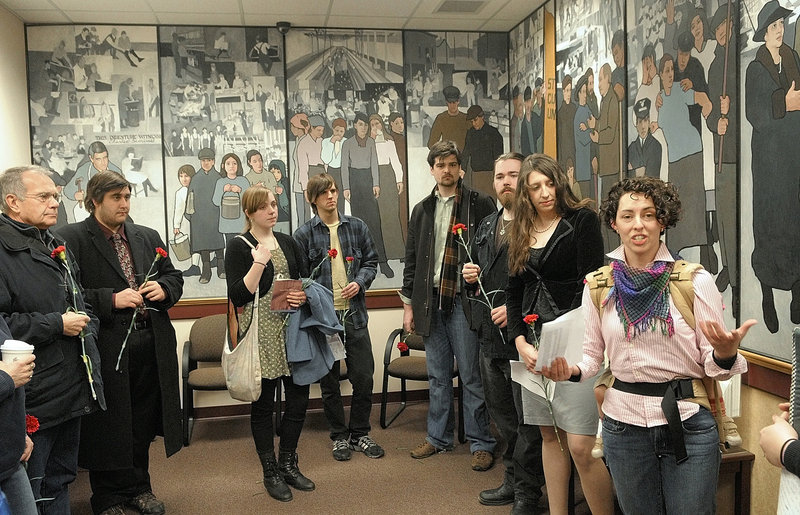AUGUSTA — A federal judge ruled Friday that Gov. Paul LePage exercised his right to government speech when he removed a mural from the Department of Labor and that he shouldn’t have to stand trial to explain his decision.
Judge John A. Woodcock Jr. issued the 91-page ruling following a lawsuit filed last year and oral arguments held in Bangor earlier this month.
“The governor has as much right not to project a message about the history of Maine labor in a state-owned mural as he would to decline to read aloud a history of labor in Maine written by the prior administration,” Woodcock wrote. “In other words, as the Supreme Court held, a government entity has the right to ‘speak for itself.'”
The controversy surrounding the 11-panel mural began a year ago, when LePage ordered that it be removed from a small waiting room at the department. The mural depicts the history of organized labor in Maine and in the country, with images of Rosie the Riveter and a shoe worker strike in Lewiston.
At the time, LePage called the mural “one sided” and said he did not want to sent that message to employers in Maine.
LePage had the mural removed and stored in a secret location, which prompted a lawsuit filed by labor and art activists alleging that LePage violated First Amendment rights protected in the Constitution.
LePage spokeswoman Adrienne Bennett said Friday that the administration felt all along that the lawsuit was more about politics than art.
“We’ve always believed this was a frivolous, politically motivated lawsuit,” she said. “It would be stunning if government officials were to be barred from making different artistic choices from their predecessors.”
Attorney Jeffrey Neil Young, who represented the plaintiffs, said in a statement they have already won the case “in the court of public opinion.”
“Mainers recognize what the court has failed to appreciate,” he said.
“That the removal of the mural is nothing less than government censorship of artistic speech in violation of the First Amendment. The mural is no more government speech than the mural that hangs in the lobby of the courthouse in Bangor when you go through security to enter the building.”
The plaintiffs haven’t yet decided whether to appeal.
The mural was commissioned in 2008 by the Baldacci administration during renovations of the leased office space in Augusta. The state spent $60,000 on the mural and directed the artist, Judy Taylor of Tremont, to create a mural that emphasized the “value and dignity of workers and their critical role in creating the wealth of the state and nation.”
During oral arguments in Bangor, plaintiffs’ attorney Jonathan Beal argued that because the artist created the work and was expressing her ideas, LePage’s decision to remove the mural did not constitute government speech. Instead, he was stifling the speech of the artist.
However, Deputy Attorney General Paul Stern disagreed, saying the governor was well within his right to remove the mural.
Woodcock ruled that it was a case of government speech and that he was wary of setting a precedent where sitting governors could be cross examined in court and asked to explain their political decisions.
“To hold a jury trial and subject elected officials to cross-examination whenever a dissident group contends that a governmental action, which affects a governmental message, is politically motivated would risk transforming the courts into stages for political theater,” he wrote.
In arguments submitted to the court, the plaintiffs argued that giving government officials power to remove works of art they disagree with would have a chilling effect on a state program that encourages artists to display their work in public buildings.
However, Woodcock said that artists must know if their work can be perceived as partisan, it may be taken down — or put back up — by new government officials.
“Of course, the political world constantly turns and in time the rejected often become the elected,” he wrote. “If the artwork is stowed away, the returned leaders may well unpack it and restore it to its original place.”
Attorney General William Schneider said in a prepared statement that individuals and the government have a right to free expression.
“As citizens, we want our government officials to speak and express their views,” he said. “Any effort by a small group to attempt to control government’s speech by bringing elected officials to trial should be viewed as a threat to our democratic principles. I am pleased that the court agreed that just as individuals are free to speak, so too is the government.”
Susan Cover — 620-7015
scover@mainetoday.com
Send questions/comments to the editors.


